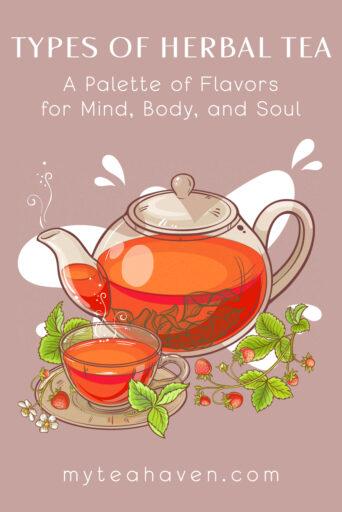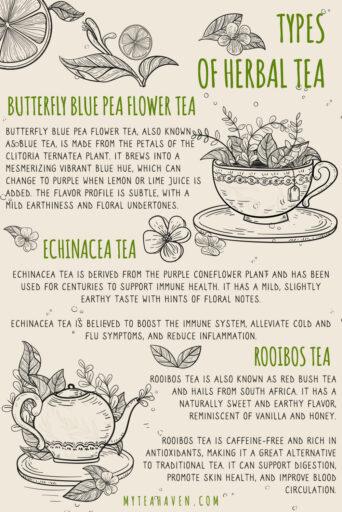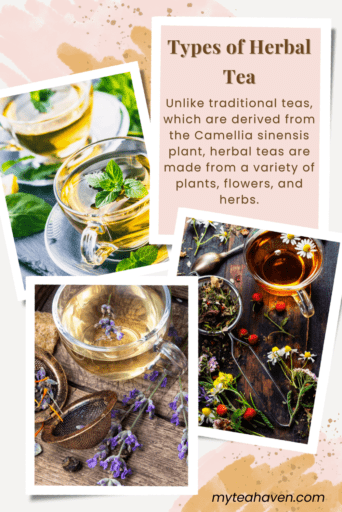Types of Herbal Tea: A Palette of Flavors for Mind, Body, and Soul
Welcome to Herbal Tea
Herbal teas, also known as tisanes, offer a delightful and refreshing way to indulge in unique flavors of tea while also providing numerous health benefits. Today I will guide you through some of the most popular types of herbal tea, highlighting their unique characteristics, benefits, and brewing techniques.
We are a participant in the Amazon Services LLC Associates Program, an affiliate advertising program designed to provide a means for us to earn fees by linking to Amazon.com and related sites. This post may contain affiliate links which means we may receive a commission, at no cost to you, for purchases made using our links. Please see my disclosure to learn more. Unless otherwise stated, all prices are in US$.
Types of Herbal Tea

Unlike traditional teas, which are derived from the Camellia sinensis plant, herbal teas are made from a variety of plants, flowers, and herbs.
This means that there is an incredibly wide range of different herbal teas available to enjoy.
Let’s take a look at some of the more popular types:
Chamomile Tea
Chamomile tea is renowned for its soothing and calming properties. It has a pleasant floral aroma and a mild, slightly sweet taste.
This tea is often used to promote relaxation and aid in sleep. Chamomile tea can also help relieve anxiety, ease menstrual cramps, and soothe an upset stomach.
To brew a perfect cup, steep chamomile flowers in hot water for about 5 minutes, allowing the flavors and therapeutic compounds to infuse fully.
Peppermint Tea
Peppermint tea offers a refreshing and invigorating experience. It has a cooling menthol flavor and a minty aroma.
Peppermint tea is known for its ability to support digestion and relieve digestive discomfort, such as gas and bloating. It can also provide relief from headaches and sinus congestion.
For optimal flavor, steep peppermint leaves in boiling water for 5 to 7 minutes, allowing the natural oils to infuse.
Rooibos Tea
Rooibos tea is also known as red bush tea and hails from South Africa. It has a naturally sweet and earthy flavor, reminiscent of vanilla and honey.
Rooibos tea is caffeine-free and rich in antioxidants, making it a great alternative to traditional tea. It can support digestion, promote skin health, and improve blood circulation.
To enjoy a cup of rooibos tea, steep the leaves in freshly boiled water for 5 to 7 minutes.
Ginger Tea
Ginger tea offers a warming and spicy experience, perfect for chilly days. It has a distinctive flavor profile with hints of citrus and earthiness.
Ginger tea is well-known for its digestive benefits, aiding in nausea relief, reducing inflammation, and boosting metabolism.
To prepare ginger tea, steep fresh ginger slices or grated ginger in hot water for 10 to 15 minutes. Add honey or lemon for added taste and benefits.
Lemon Balm Tea
Lemon balm tea provides a refreshing citrus flavor with delicate herbal undertones.
Steep lemon balm leaves in hot water for 5 to 7 minutes to extract the optimal flavors and therapeutic properties.
It has a calming effect on the mind and body, helping reduce stress and promote relaxation. Lemon balm tea also supports healthy digestion, soothes menstrual cramps, and uplifts the mood.
Hibiscus Tea
Hibiscus tea boasts a vibrant ruby-red color and a tart, cranberry-like taste. It is packed with antioxidants and vitamin C, making it a fantastic choice for supporting immune health.
Hibiscus tea can also help regulate blood pressure, lower cholesterol levels, and provide a refreshing burst of hydration.
Steep dried hibiscus flowers in hot water for 5 to 10 minutes, adjusting the steeping time based on your preferred strength.
Echinacea Tea
Echinacea tea is derived from the purple coneflower plant and has been used for centuries to support immune health. It has a mild, slightly earthy taste with hints of floral notes.
Echinacea tea is believed to boost the immune system, alleviate cold and flu symptoms, and reduce inflammation.
To prepare a cup of echinacea tea, steep the dried echinacea flowers or tea bags in hot water for 10 to 15 minutes. Add a touch of honey or lemon for enhanced flavor.
Lavender Tea
Lavender tea offers a soothing and aromatic experience. It has a gentle floral flavor with a hint of sweetness.
Lavender tea is known for its calming properties, helping to alleviate stress, anxiety, and insomnia. It can also aid in digestion and promote relaxation.
To enjoy a cup of lavender tea, steep dried lavender buds in hot water for 5 to 7 minutes. Savor the delicate fragrance and let the tea bring tranquility to your day.
Dandelion Root Tea
Dandelion root tea is made from the dried roots of the dandelion plant. It has a rich, earthy flavor with slightly bitter undertones.
Dandelion root tea is renowned for its detoxifying properties and its ability to support liver health. It may also aid digestion, promote healthy skin, and act as a gentle diuretic.
To prepare dandelion root tea, steep roasted dandelion root in hot water for 10-15 minutes. Consider adding a touch of cinnamon or honey to balance the flavors.
Butterfly Blue Pea Flower Tea
Butterfly blue pea flower tea, also known as blue tea, is made from the petals of the Clitoria ternatea plant. It brews into a mesmerizing vibrant blue hue, which can change to purple when lemon or lime juice is added. The flavor profile is subtle, with a mild earthiness and floral undertones.
Butterfly blue pea flower tea is known for its antioxidant properties and may provide benefits for skin health and cognitive function.
To prepare this unique tea, steep the dried blue pea flowers in hot water for 5 to 7 minutes. Experiment with lemon or lime juice for color-changing effects and added zest.
A Few Final Thoughts
Exploring the wide range of herbal teas opens up a world of delightful flavors and health benefits. Whether you seek relaxation, improved digestion, or immune support, there’s a herbal tea that suits your preferences.
Experiment with different types and brewing techniques to find your perfect cup. Embrace the joy of sipping herbal tea, and let its natural goodness nourish your body and soul.
Remember, when looking for herbal teas, follow your taste preferences and choose the ones that resonate with you. Embrace the journey of discovering new flavors and reaping the wonderful benefits that herbal teas have to offer. Cheers to your tea adventures!
Some Questions You Might Have
- Is herbal tea safe for everyone?
It’s generally safe, but it’s essential to be aware of any potential allergies or interactions with medications. Consult with a healthcare professional if you have any concerns or specific health conditions.
- Can I mix different types of herbal tea together?
Absolutely! Experimenting with different combinations can be a fun way to create unique flavors and benefits. Just ensure that the herbs are safe to consume and complement each other well.
- How often should I drink herbal tea to experience the benefits?
It’s recommended to incorporate herbal tea into your routine regularly without overdoing it for optimal benefits. Enjoying 1 to 3 cups per day can be a good starting point, but always remember that moderation is key.
- Can I add sweeteners or milk to herbal tea?
Herbal teas often have pleasant natural flavors, but you can add sweeteners like honey or stevia if desired. Milk is not commonly added to herbal teas, as they are generally enjoyed on their own or with a slice of lemon.
- Are there any herbal teas with caffeine?
Herbal teas are naturally caffeine-free, which makes them an excellent alternative to traditional caffeinated teas. That being said, be cautious of certain herbal blends that might include ingredients like yerba mate or guayusa, which do contain caffeine. Always check the label or description before purchasing.
















